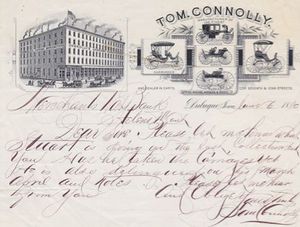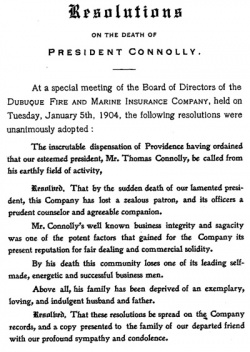Encyclopedia Dubuque
"Encyclopedia Dubuque is the online authority for all things Dubuque, written by the people who know the city best.”
Marshall Cohen—researcher and producer, CNN
Affiliated with the Local History Network of the State Historical Society of Iowa, and the Iowa Museum Association.
CONNOLLY, Thomas: Difference between revisions
No edit summary |
No edit summary |
||
| Line 1: | Line 1: | ||
CONNOLLY, Thomas. (Ireland, 1837-Dubuque, IA, Dec. 29, 1903). President, National Carriage Builders of America. Financially successful through his carriage factory, Connolly had one of Dubuque's most elegant mansions built in 1893 on the 1600 block of Iowa Street using [[QUEEN ANNE ARCHITECTURE]]. Fine woods floated down the [[MISSISSIPPI RIVER]] from forests in Wisconsin and Minnesota were used in the construction. Connolly personally supervised the selection of the planks, discarding all but the perfect. The home was one of the few in Dubuque with a carriage step, a raised platform three feet off the ground enabling visitors to leave their carriages without soiling their clothes. The home was still present in 2011 adjacent to [[JACKSON PARK]] although it had been reduced from its former state by fire. | CONNOLLY, Thomas. (Ireland, 1837-Dubuque, IA, Dec. 29, 1903). President, National Carriage Builders of America. Financially successful through his carriage factory, Connolly had one of Dubuque's most elegant mansions built in 1893 on the 1600 block of Iowa Street using [[QUEEN ANNE ARCHITECTURE]]. Fine woods floated down the [[MISSISSIPPI RIVER]] from forests in Wisconsin and Minnesota were used in the construction. Connolly personally supervised the selection of the planks, discarding all but the perfect. The home was one of the few in Dubuque with a carriage step, a raised platform three feet off the ground enabling visitors to leave their carriages without soiling their clothes. The home was still present in 2011 adjacent to [[JACKSON PARK]] although it had been reduced from its former state by fire. | ||
[[File: | [[File:connollyletter.jpg|300px|thumb|left|Business letter.]]Connolly's "manufactory" or carriage-manufacturing plant on the southwest corner of Seventh and Iowa [[STREETS]] contributed sales of $200,000 to the local economy by 1885 with such products as buggies, carriages, sleighs and bicycles. Unlike [[COOPER, Augustine A.|Augustine A. COOPER]], a business rival but friend, Connolly was advertising automobiles by 1906. According to the Telegraph Herald of January 24, 1910, the company was making the chassis for the [[ADAMS-FARWELL AUTOMOBILES]]. | ||
Connolly began business in Dubuque on August 23, 1858, with the purchase of a small factory on the corner of Locust and Eighth [[STREETS]]. At about the same time, he established a small wagon factory on Bluff Street across from the [[WALES HOTEL]]. In 1860 the Eighth Street factory was burned to the ground. The building was an uninsured loss, and Connolly was forced to pay 25 percent interest on money he borrowed to resume business. | Connolly began business in Dubuque on August 23, 1858, with the purchase of a small factory on the corner of Locust and Eighth [[STREETS]]. At about the same time, he established a small wagon factory on Bluff Street across from the [[WALES HOTEL]]. In 1860 the Eighth Street factory was burned to the ground. The building was an uninsured loss, and Connolly was forced to pay 25 percent interest on money he borrowed to resume business. | ||
Revision as of 02:27, 10 July 2013
CONNOLLY, Thomas. (Ireland, 1837-Dubuque, IA, Dec. 29, 1903). President, National Carriage Builders of America. Financially successful through his carriage factory, Connolly had one of Dubuque's most elegant mansions built in 1893 on the 1600 block of Iowa Street using QUEEN ANNE ARCHITECTURE. Fine woods floated down the MISSISSIPPI RIVER from forests in Wisconsin and Minnesota were used in the construction. Connolly personally supervised the selection of the planks, discarding all but the perfect. The home was one of the few in Dubuque with a carriage step, a raised platform three feet off the ground enabling visitors to leave their carriages without soiling their clothes. The home was still present in 2011 adjacent to JACKSON PARK although it had been reduced from its former state by fire.
Connolly's "manufactory" or carriage-manufacturing plant on the southwest corner of Seventh and Iowa STREETS contributed sales of $200,000 to the local economy by 1885 with such products as buggies, carriages, sleighs and bicycles. Unlike Augustine A. COOPER, a business rival but friend, Connolly was advertising automobiles by 1906. According to the Telegraph Herald of January 24, 1910, the company was making the chassis for the ADAMS-FARWELL AUTOMOBILES.
Connolly began business in Dubuque on August 23, 1858, with the purchase of a small factory on the corner of Locust and Eighth STREETS. At about the same time, he established a small wagon factory on Bluff Street across from the WALES HOTEL. In 1860 the Eighth Street factory was burned to the ground. The building was an uninsured loss, and Connolly was forced to pay 25 percent interest on money he borrowed to resume business.
Connolly built a large factory for his entire stock on Seventh and Iowa streets in 1872. Three years later this building was also destroyed by fire. This time Connolly collected his insurance money and rebuilt a larger factory, which became one of the most prosperous in the Midwest. By 1885 Connolly's factory produced one thousand buggies, carriages, and sleighs annually ranging in price from $100 to $1,500.
Connolly was an active civic supporter of Dubuque. He encouraged the construction of the Julien Hotel and the BANK AND INSURANCE BUILDING. He served as president of the DUBUQUE FIRE AND MARINE INSURANCE COMPANYand the Bank and Insurance Building and was director of the Hotel Julien Building Company, Iowa Trust and Savings Bank, and the KEY CITY GAS COMPANY. He was succeeded in his business by his son Maurice CONNOLLY.
---
Source:
"Our Spirited Years," Telegraph Herald, 1976 Telegraph Herald, January 24, 1910



